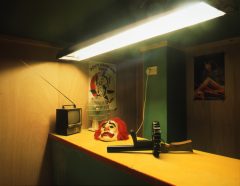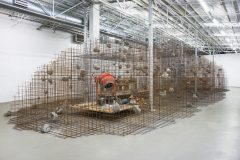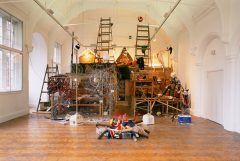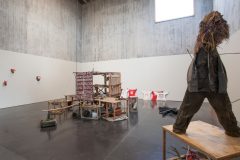
Letter from Mike Nelson
Mike Nelson sent the following letter to Cornwall Workshop participants on 22 February 2024:
Dear All,
I write this letter from my home in South London whilst in the grip of a flu-like cold. This house is where I spent the periods of lockdown during the Covid pandemic so my current condition and its similarities to the aforementioned brings a certain degree of flashback; a disjointed and unfocused one, as it still occupies a space of dreamlike unreality for me.
During that time – in between studying the urban woodland through the windows of my 1960s terraced house, and the occasional walk within them – I re-read Robinson Crusoe. Like the spin of a roulette wheel, or riding a macabre carousel, people’s circumstances were incredibly varied when the pandemic hit and the metaphorical rotation stopped… It left the world’s populations in a myriad of varied situations from country to country, and from one person to the next. Luckily, my situation wasn’t so bad, and yet the experience I think has had long lasting consequences for all of us both as individuals and at a societal level. The parallels between the marooned sailor (Robinson Crusoe) and my situation, sitting at home in 2020, seem an unlikely analogy but the more I read the more the similarities grew. Crusoe was isolated, alone, and strangely so were we – if as a family unit. Crusoe’s focus was on finding food, making shelter and striving to make contact with (human) life outside his isolation. These preoccupations had become mine in lieu of my life before. Of course, the situation was visibly different, but the human aspect felt comparable. How could I feel alone and isolated in the centre of a huge city whilst surrounded by millions of people? And how could I feel such empathy with the account of a shipwrecked sailor written 300 years ago?
The answer seemed twofold, one related to the sense of isolation irrespective of my location, and the other perhaps related more tangentially to the cause. The experience of feeling isolated or even alienated within a mass of people is nothing new – popular music has been addressing this subject for decades – however its underpinning cause and timing is what interested me… The period of the late seventeenth and early eighteenth century was a time of consolidation, of structures that enabled the massing of individual and state capital, and it was one of those that had led to Crusoe’s fate. Ships sent out to exploit resources from distant continents were part of the construct of the British Empire accruing wealth and power. As the trade routes became more populated and numerous, a claim could be made that they existed as a proto-internet, the first global communication system. It could also be claimed that both ‘new’ worlds were rapidly exploited: the real spaces of other people’s lands and the virtual spaces of the internet. So, as I sat in my front room considering Crusoe’s fate, I also existed in a time of advanced capitalism in virtual space; no longer was the internet offering access and therefore freedom to the masses and dispossessed, but a new, highly monetized, structure was in place, advancing primarily the interests of a few. Mine was a world full of people unknowingly isolated within the vortex of a rapidly accelerating virtual world within the ‘promise’ of connectivity – a process sped up by a frightened populace rightfully wary of human contact – while the powers of commerce exploited the situation to their own financial advantage.
So where does this leave us? Crusoe implemented the structures of his own morality upon the island, those of his Christian faith but also of trade and its dark associations with empire and all that went with it. However badly it has aged, there was a morality to his life on the island, a discipline that – while including aspects that are deeply unacceptable to us now – did provide a guide of sorts. It seems that in the aftermath of my own incarceration we have entered a vacuum of prevailing belief, where the greed and avarice of market capitalism no longer has a gate-keeper, and that we have finally marked the end of what I understood as the Modernist era, itself a religion akin to those other meters of morality that had come before. These observations are those of an interested lay person as I’m no theorist, either political or philosophical, but through my own work and its focus this is my sense of the world now.
With its feeling of isolation and the sea on three sides, its fourth side cut in half by the Helford estuary, the Lizard can almost feel like an island and can provide an interesting backdrop to expand upon these thoughts. Ideas around belief and identity underpin all of our lives and histories and seem particularly relevant to Cornwall at this present moment. I am drawn to the term ‘inverted Crusoeism’ where people are drawn to be marooned on an ‘island’ of sorts, a wordplay that was first coined by JG Ballard in regard to his own genre dating back to his 1964 novel The Drowned World, but most recognisably evident in his Robinson Crusoe parody, Concrete Island in 1974. The idea seems pertinent because perhaps this is why we are attracted to coming here, not just to the residency, but for many the allure of creating their own world by the sea has become an increasingly attractive answer to the anxiety of a perceived wider world. In regard to my own work the interest in belief structures has been a constant (for example in The Coral Reef, 2000) as has the potential of the allegorical structure of the desert island – most notably in my ongoing Studio Apparatus series set within or upon a theatrical construction resembling a ‘mysterious Island’ (a reference to Jules Verne’s parody of such tales in his book School for Crusoes). Within the Studio Apparatus series, old works and ideas are forced together in a process I call ‘futurobjectics’, a bastardisation and product of the word ‘futuroliguistics’ from the novel The Futurological Congress by Stanisław Lem. Within Lem’s narrative ‘futurolinguistics’ is the production of new words by the morphing, distorting and fusing of existing words, producing terms that describe actual things that will exist in the future. This predictive mechanism is something I utilised to help with the production of my own art. In a way ‘inverted Crusoeism’ is a perfect example of the original idea.
This all sounds rather dry: a lot of questions and no clear structure to obtain any answers, but of course I’m not really expecting us to find any. The idea is to explore what’s going on from the very particular context of this residency, by investigating spaces and objects in such a way that they may give us glimpses of histories and therefore possible futures.
My understanding of objects and space has been greatly informed by the story Roadside Picnic by Arkady and Boris Strugatsky, which was later made into the film Stalker, directed by Andrei Tarkovsky. The narrative concerns the visitation across various sites around the world by extraterrestrials, and centres on an unspecified site where ‘stalkers’ break into these zones to navigate the landscapes and collect objects left behind to sell illegally to the universities, who in turn examine them and try to ascertain why the extraterrestrials came to our world. The title alludes to the conclusion of one of the researchers: that the material left behind is both inexplicable and indescribable in terrestrial terms and means both everything and nothing simultaneously. Their efforts to interpret the material is like a colony of ants trying to understand the debris left behind by humans after a picnic. This flickering in and out of focus is what interests me within a work of art, the glimpse of something beyond its components and its return back to that very same matter. In some ways it reminds me of my father teaching me to look to the side of an object in the dark allowing me clearer vision in my peripheral view. These ideas of looking, and (mis)understanding I would like to apply to our time on the ‘island’. Although some of the trips will take us further afield, the radius will remain quite close.
I would like the week to be spent looking and discussing in the most open of ways, I would like to avoid any situations of the school room with set tasks as much as we can, although my talk is one I can’t avoid, unfortunately! To help with our reflections upon this time in which we exist and the place in which we find ourselves I’ve suggested that we should visit places manifest with histories of belief and redolent of those identities, sites that are ancient, historical or contemporary. The categorisations should be as loose as possible and should embrace places of worship and ceremonial burial, but also industry, commerce and shipping. Other worlds – natural, constructed or imagined – should be included in the list and any suggestions would be welcome from you, as your knowledge of the area will definitely be greater than mine.
Although I’m keen to avoid tasks I would like to offer one more literary reference and to borrow from it for our time spent. Postcards, by Annie Proulx, is a book I read many years ago whilst making the work Lionheart in 1997, a work about Britain’s identity at that particular point in time and its relationship to Europe. The book very much helped my ideas to formulate but also fed into the structure of The Coral Reef, realised later in 2000. The idea of translating narrative structure into spatial structure has been a core part of my work and the reverse is evident here in Proulx’s book. Here, each chapter is foregrounded by a postcard predominantly from the main protagonist – aptly named Loyal Blood – to his parents back home on the ranch. There is no address or contact number, so the communication is one way. What I liked about this device – if we can call it such – is that it opened up a different space within the narrative, something wholly other to the text. It meters time but also describes geographical space, plotting itself across the postal structure of the United States.
What I would like to offer you are two blank postcards per day to do with what you wish. A drawing, poem or note, posted or not, to whom unspecified.
Mike Nelson

Mike Nelson, The Coral Reef, 2000. Installation view, Matt’s Gallery, London, 2000. Courtesy the artist and 303 Gallery, New York; Galleria Franco Noero, Turin; Matt’s Gallery, London; and neugerriemschneider, Berlin.

Mike Nelson, Studio Apparatus for Kunsthalle Münster – A Thematic Instalment Observing the Calendrical Celebration of its Inception: Introduction; towards a linear understanding of notoriety, power, and their interconnectedness; futurobjecs (misspelt); mysterious island*. / *see introduction / or Barothic shift, 2014. Installation view, Kunsthalle Münster, Münster, 2014. Photo: Thomas Wrede. Courtesy the artist and 303 Gallery, New York; Galleria Franco Noero, Turin; Matt’s Gallery, London; and neugerriemschneider, Berlin.

Mike Nelson, Studio Apparatus for Camden Arts Centre – An Introductory Structure: Introduction; a lexicon of phenomena and information association; futurobjectics (in three sections); mysterious island*, or Temporary Monument, 1998/2010. Installation view, Camden Arts Centre, 2010. Photo: Andy Keate © Camden Arts Centre. Courtesy the artist and 303 Gallery, New York; Galleria Franco Noero, Turin; Matt’s Gallery, London; and neugerriemschneider, Berlin.

Mike Nelson, Lionheart, 1997. Installation view, The New Art Gallery Walsall, 2018. Photo: Jonathan Shaw. Courtesy the artist and 303 Gallery, New York; Galleria Franco Noero, Turin; Matt’s Gallery, London; and neugerriemschneider, Berlin.
